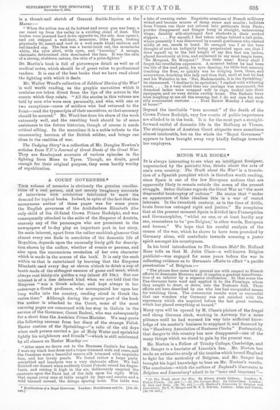A COURT GOVERNESS.*
THIS volume of memoirs is obviously the genuine recollec- tions of a real person, and not merely imaginary accounts of interviews with celebrities fabricated to meet the demand for topical books. Indeed, in spite of the fact that the anonymous author of these pages was for some years
the English governess of the Archduchess Elizabeth (the only child of the ill-fated Crown Prince Rudolph), and was consequently attached to the suite of the Emperor of Austria, scarcely any of the personages who are prominent in the newspapers of to-day play an important part in her story. Its main interest, apart from the rather snobbish glamour that almost every one finds in anecdotes of the domestic life of Royalties, depends upon the unusually lively gift for descrip- tion shown by the author, whether of events or persons, and also upon the unconscious revelation of her own character which is made in the course of the book'. It is only the snob
within us that is entertained by learning that the Empress Elizabeth used every day at eleven o'clock to drink a cup of broth made of the atisongest essence of game and meat, which always cost thirty-six gulden a cup (about £3 10s.). But our interest is of a lees debased kind when we are told that the Empress was a Greek scholar, and kept always in her
entourage a Greek professor, who accompanied her upon her long walks into the country, reading aloud in Greek the entire time." Although during the greater pert of the book the author is attached to the Court, some of the most amusing pages are concerned with her stay in Galicia in the service of the Governor, Count Baden', who was subsequently for a short time the Austrian Prime Minister. We may quote the following account from her diary of the strange Polish
Easter custom of the Sprinkling—" a relic of the old days when each person carried a jar of Holy Water and sprinkled
lightly his neighbours and friends "—which is still celebrated by all classes on Easter Monday :—
"After mass we drove out to the Baroness Cecile's for lunch. I wore my black lace dress and a toque trimmed with red roses, and the Countess wore a beautiful mauve silk trimmed with exquisite lace, and her lovely pearls. Wo found rather a large party assembled and luncheon was a very elaborate affair. Wo had finished our dessert when suddenly Count Potocki seized his finger- basin, and raising it high in the air, deliberately emptied the keontonts upon the Paris hat of the lady upon his right. With that signal every man at table caught up jugs and carafes and a wild turmoil ensued, the deluge sparing none. The table was Recollections of a .Royal Governess. London : Hutohineon and Co. [10s. Gd. net.] a lake of running water. Exquisite creations of French millinery wilted and became masses of damp straw and muslin ; toilettes from Vienna ran their wet colours into petticoats from Paris ; powder disappeared and fringes hung in straight, unbecoming wisps; daintily silk-stockinged foot sloshede In their soaked slippers. . . . For myself, I had taken refuge behind a tall palm, whore presently I was discovered by a small gentleman who rushed wildly at me, carafe in hand. So enraged was I at the bare thought of such an indignity being perpetrated upon 'no, that I drew myself up to the full height of my five foot ten inches, glared ferociously at him, and exclaimed in my most tragic tones, 'No Morgenit, No Morgeng.!' Poor little manl Never shall I forget his 'crestfallen expression. A moment before he had been the life of the mad party, his eyes dancing, his little feet scarcely touching the floor, so quickly was he dodging here, there, and everywhere, douching this lady and then that, until at last he had met his Waterloo in me. But, Mademoiselle, it is the Sprinkling,' he stammered. 'I decline to be sprinkled,' I replied with withering scorn. . . . In a very short time our carriage was announced, the drenched ladies were wrapped wdll in rugs, tucked into their equipages, and we wore driven swiftly home. The 13adenis have been laughing at me all the evening, but I do not care for such silly nonsensical customs. . , Next Easter Monday I shall stop at home!"
Beyond the inevitable "true account"" of the death of the Crown Prince Rudolph, very few events of public importance are alluded to in the book. It is for the most part a straight- forward recital of domestic life in the Hofburg at Vienna. The stringencies of Austrian Court etiquette were sometimes almost intolerable, but on the whole the "Royal Governess" appears to have brought away very kindly feelings towards her employers.
















































 Previous page
Previous page